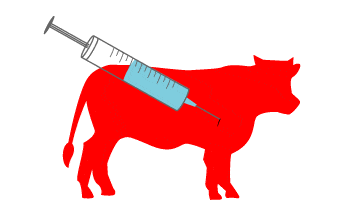Growth Hormone use in Livestock: Is It Safe?
 Growth promoters have been a controversial topic in production and the consumer understanding of the use in animals have raised food safety questions. To be simple it benefits producers and the consumer by increasing lean tissue growth in animals (specifically beef cattle) thus increasing weight gain in a shorter period of time – reducing feed costs and end cost to the consumer.
Growth promoters have been a controversial topic in production and the consumer understanding of the use in animals have raised food safety questions. To be simple it benefits producers and the consumer by increasing lean tissue growth in animals (specifically beef cattle) thus increasing weight gain in a shorter period of time – reducing feed costs and end cost to the consumer.
But is it safe? The following has been quoted from the Health Canada web site :“Hormonal growth promoters occur naturally in animals. It is possible to raise beef cattle without the use of synthetic HGPs, however, the cost of production would increase, making beef more expensive for consumers.
There are six hormonal growth promoters approved in Canada for use in beef cattle: three natural – progesterone, testosterone and estradiol-17ß; and three synthetic – trenbolone acetate (TBA), zeranol and melengestrol acetate (MGA). Hormonal growth promoters are not approved for use in any species other than beef cattle.”
The capsule is administered in the base of the ear – providing a slow release of hormone over a short time – eventually dispersing the levels to zero. These initial levels are very low and in comparison to naturally occurring hormones in other foods such as broccoli – it is very insignificant.
Implants are not permitted for use in veal calves and on slaughter there is strict inspection regulations stated for examination of live animals prior to slaughter for presence of implants. DES (synthetic stilbene derivative diethylstilbestrol) an anabolic steroid has been prohibited for use in animals in Canada since 1974.
If any implant is found in any region on the animal other than the ear the animal is condemned for human food use. Producers come under strict scrutiny if one veal animal has been detected to have an implant; all subsequent animals are inspected and samples from slaughtered carcasses are taken for testing. On farm inspections are also then followed.
So is on-farm food safety important? In the Verified Beef program – records are strictly maintained for administration of implants, vaccinations, tagging (mandatory CCIA RFID tags for traceability); sick animals administered antibiotics are also recorded. Feed records and sources of the feed as well as any medicated or feed additives used are maintained. Basically an on farm HACCP-like plan.
